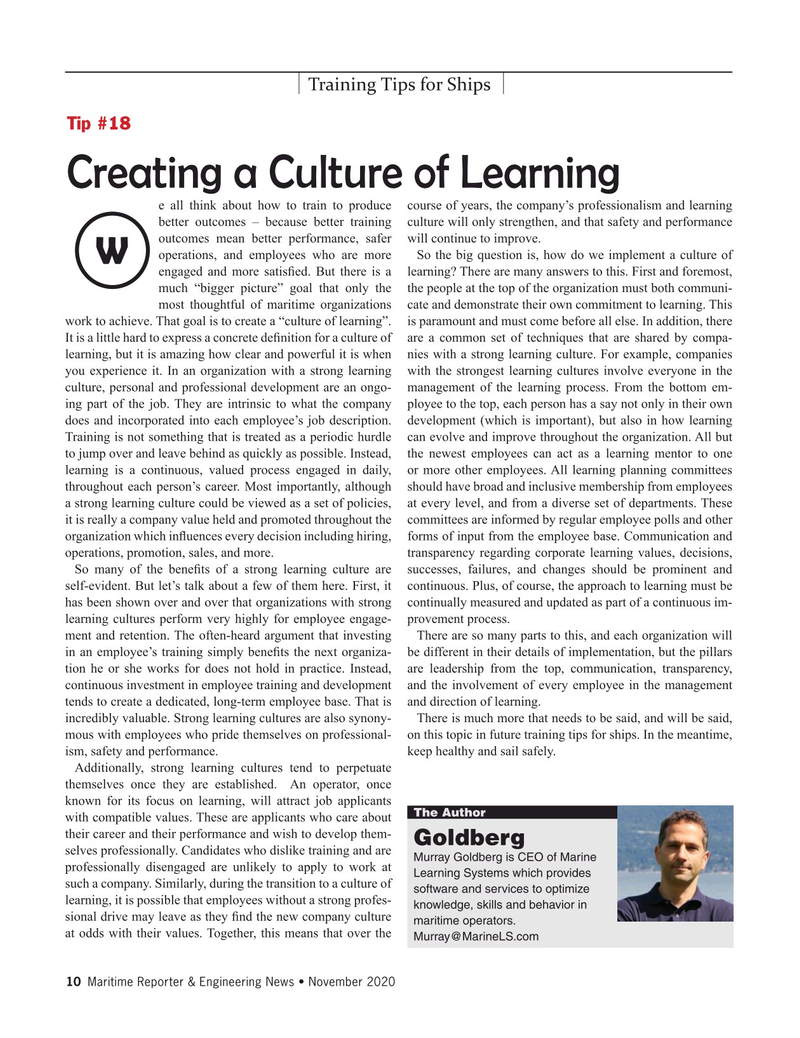
Page 10: of Maritime Reporter Magazine (November 2020)
Workboat Edition
Read this page in Pdf, Flash or Html5 edition of November 2020 Maritime Reporter Magazine
Training Tips for Ships
Tip #18
Creating a Culture of Learning e all think about how to train to produce course of years, the company’s professionalism and learning better outcomes – because better training culture will only strengthen, and that safety and performance outcomes mean better performance, safer will continue to improve.
operations, and employees who are more So the big question is, how do we implement a culture of
W engaged and more satis? ed. But there is a learning? There are many answers to this. First and foremost, much “bigger picture” goal that only the the people at the top of the organization must both communi- most thoughtful of maritime organizations cate and demonstrate their own commitment to learning. This work to achieve. That goal is to create a “culture of learning”. is paramount and must come before all else. In addition, there
It is a little hard to express a concrete de? nition for a culture of are a common set of techniques that are shared by compa- learning, but it is amazing how clear and powerful it is when nies with a strong learning culture. For example, companies you experience it. In an organization with a strong learning with the strongest learning cultures involve everyone in the culture, personal and professional development are an ongo- management of the learning process. From the bottom em- ing part of the job. They are intrinsic to what the company ployee to the top, each person has a say not only in their own does and incorporated into each employee’s job description. development (which is important), but also in how learning
Training is not something that is treated as a periodic hurdle can evolve and improve throughout the organization. All but to jump over and leave behind as quickly as possible. Instead, the newest employees can act as a learning mentor to one learning is a continuous, valued process engaged in daily, or more other employees. All learning planning committees throughout each person’s career. Most importantly, although should have broad and inclusive membership from employees a strong learning culture could be viewed as a set of policies, at every level, and from a diverse set of departments. These it is really a company value held and promoted throughout the committees are informed by regular employee polls and other organization which in? uences every decision including hiring, forms of input from the employee base. Communication and operations, promotion, sales, and more. transparency regarding corporate learning values, decisions,
So many of the bene? ts of a strong learning culture are successes, failures, and changes should be prominent and self-evident. But let’s talk about a few of them here. First, it continuous. Plus, of course, the approach to learning must be has been shown over and over that organizations with strong continually measured and updated as part of a continuous im- learning cultures perform very highly for employee engage- provement process. ment and retention. The often-heard argument that investing There are so many parts to this, and each organization will in an employee’s training simply bene? ts the next organiza- be different in their details of implementation, but the pillars tion he or she works for does not hold in practice. Instead, are leadership from the top, communication, transparency, continuous investment in employee training and development and the involvement of every employee in the management tends to create a dedicated, long-term employee base. That is and direction of learning.
incredibly valuable. Strong learning cultures are also synony- There is much more that needs to be said, and will be said, mous with employees who pride themselves on professional- on this topic in future training tips for ships. In the meantime, ism, safety and performance. keep healthy and sail safely.
Additionally, strong learning cultures tend to perpetuate themselves once they are established. An operator, once known for its focus on learning, will attract job applicants
The Author with compatible values. These are applicants who care about their career and their performance and wish to develop them-
Goldberg selves professionally. Candidates who dislike training and are
Murray Goldberg is CEO of Marine professionally disengaged are unlikely to apply to work at
Learning Systems which provides such a company. Similarly, during the transition to a culture of software and services to optimize learning, it is possible that employees without a strong profes- knowledge, skills and behavior in sional drive may leave as they ? nd the new company culture maritime operators. at odds with their values. Together, this means that over the
[email protected] 10 Maritime Reporter & Engineering News • November 2020
MR #11 (1-17).indd 10 11/9/2020 8:43:38 AM

 9
9

 11
11
